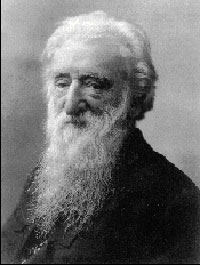
William Booth (1829-1912)
William Booth (April 10, 1829 - August 20, 1912) was the founder and 1st General (1878-1912) of The Salvation Army.
He was born in Sneinton, Nottingham, England, the only son of four surviving children born to Samuel Booth (1775-1832) and Mary Moss (1794-1875). His father was wealthy, but lost his money to bad investments and left his widow and children poor.
At age 13, William was apprenticed to a pawnbroker's shop to help support his mother and sisters. In 1845, he was born again of the spirit. He read extensively and trained himself in writing and in speech, becoming a Methodist lay preacher. He moved to London in 1849, regularly sending a portion of his wages from the pawnbroker home to his mother.
He also continued his lay preaching. In 1852, he became a licensed minister and travelled whenever he could, evangelising in Lincolnshire, Yorkshire, Cornwall and Wales.
William Booth and Catherine Mumford were married June 16, 1855 at Stockwell Green Congregational Church in London. She became his helpmate in his ministries, and was an ardent preacher herself, until she died in 1890. They had eight children: Bramwell Booth, Ballington Booth, Kate Booth, Emma Booth, Herbert Booth, Marie Booth, Evangeline Booth and Lucy Booth.
Though he became a prominent Methodist evangelist, he was unhappy with the ministries of the church. He wanted to reach out to the poor and desperate souls who were being shunned as lowly creatures. Believing the Methodists had become too middle class and snobbish, he became an independent evangelist in 1861. His doctrine remained much the same, though. He preached that eternal punishment was the fate of the unsaved and the necessity of repentance and the promise of holiness, manifesting itself in a life of love for God and mankind. Eventually, the Booth's children became involved in the ministry.
In 1865, he and Catherine opened The Christian Revival Society, and later changed its name to The Christian Mission, in the East End of London, where they held meetings every evening and on Sundays, to offer repentance, Salvation and Christian ethics to the poorest and most needy, including alcoholic criminals and prostitutes.
He and his followers practiced what they preached. They performed self-sacrificing Christian and social work, such as opening "Food for the Million" shops (soup kitchens), not caring if they were scoffed at or derided for their Christian ministry work.
Deciding there was a need for revitalisation, William Booth changed the name of the church in 1878 to The Salvation Army, modelling it after the military, with its own flag (or colours) and its own music. He and the other soldiers in God's Army would wear the Army's own uniform, 'putting on the armour,' for meetings and ministry work. He became the General and his other ministers were given appropriate ranks as officers.
Though the early years were lean ones, with the need of money to help the needy an ever growing issue, the General and The Salvation Army persevered. In the early 1880s, operations were extended to other countries, notably the USA and India.
During his lifetime, the General established Army work in 58 countries and colonies, travelling extensively and holding salvation meetings.
General Booth regularly published a magazine and was the author of a number of books; he also composed several songs. His book In Darkest England and the Way Out not only became a bestseller after its 1890 release, it set the foundation for the Army's modern social welfare schemes.
The book speaks of abolishing vice and poverty by establishing homes for the homeless, farm communities where the urban poor can be trained in agriculture, training centres for prospective emigrants, homes for fallen women and released prisoners, aid for the poor, and help for alcoholics. He also lays down schemes for poor men's lawyers, banks, clinics, industrial schools and even a seaside resort. He says that if the state fails to meet its social obligations it will be the task of each Christian to step into the breach. In Darkest England and the Way Out was reprinted in 1970.
Opinion of the Army and General Booth eventually changed to that of favour. In his later years, he was received in audience by kings, emperors and presidents, who were among his ardent admirers. Even the mass media began to use his title of 'General' with reverence.
General Booth explained, 'Salvationism means simply the overcoming and banishing from the earth of wickedness.' His mission was to win the world for Jesus. The Salvation Army was a classic 'ultra-revivalist movement,' preaching repentance and faith in the Lord Jesus Christ as the means of forgiveness and regeneration.
General William Booth died at age 83 in Hadley Wood, London. He is interred with his wife in Abney Park Cemetery, London.